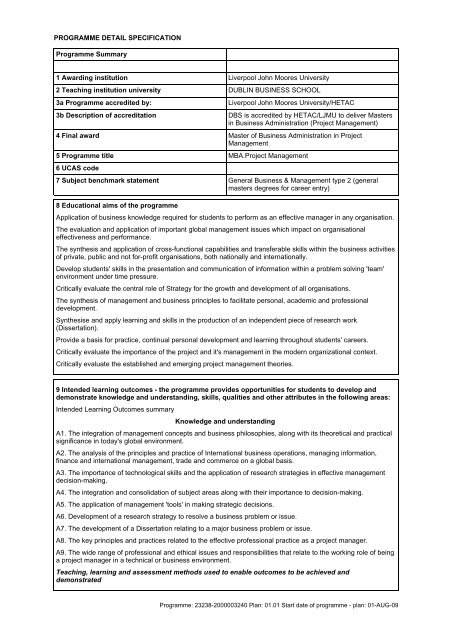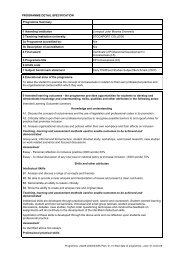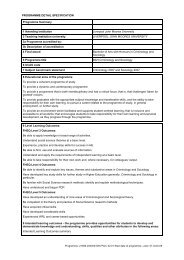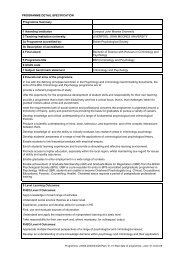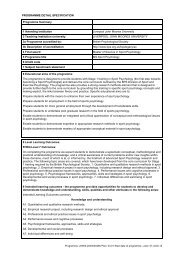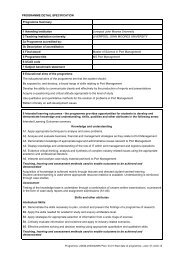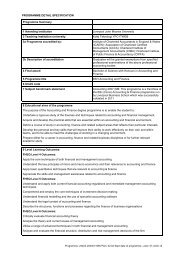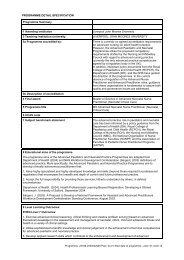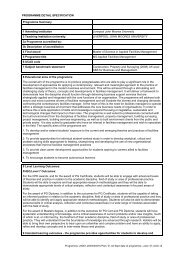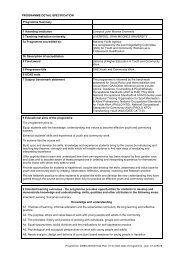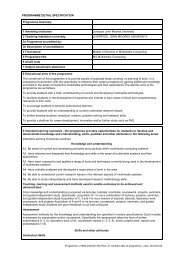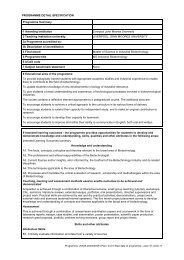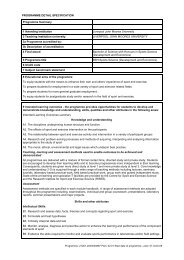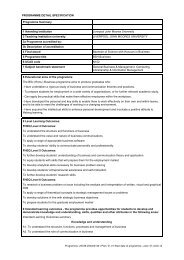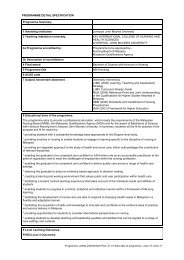Project Management - Liverpool John Moores University
Project Management - Liverpool John Moores University
Project Management - Liverpool John Moores University
Create successful ePaper yourself
Turn your PDF publications into a flip-book with our unique Google optimized e-Paper software.
PROGRAMME DETAIL SPECIFICATION<br />
Programme Summary<br />
1 Awarding institution <strong>Liverpool</strong> <strong>John</strong> <strong>Moores</strong> <strong>University</strong><br />
2 Teaching institution university DUBLIN BUSINESS SCHOOL<br />
3a Programme accredited by:<br />
3b Description of accreditation<br />
<strong>Liverpool</strong> <strong>John</strong> <strong>Moores</strong> <strong>University</strong>/HETAC<br />
DBS is accredited by HETAC/LJMU to deliver Masters<br />
in Business Administration (<strong>Project</strong> <strong>Management</strong>)<br />
4 Final award Master of Business Administration in <strong>Project</strong><br />
<strong>Management</strong><br />
5 Programme title MBA.<strong>Project</strong> <strong>Management</strong><br />
6 UCAS code<br />
7 Subject benchmark statement General Business & <strong>Management</strong> type 2 (general<br />
masters degrees for career entry)<br />
8 Educational aims of the programme<br />
Application of business knowledge required for students to perform as an effective manager in any organisation.<br />
The evaluation and application of important global management issues which impact on organisational<br />
effectiveness and performance.<br />
The synthesis and application of cross-functional capabilities and transferable skills within the business activities<br />
of private, public and not for-profit organisations, both nationally and internationally.<br />
Develop students' skills in the presentation and communication of information within a problem solving 'team'<br />
environment under time pressure.<br />
Critically evaluate the central role of Strategy for the growth and development of all organisations.<br />
The synthesis of management and business principles to facilitate personal, academic and professional<br />
development.<br />
Synthesise and apply learning and skills in the production of an independent piece of research work<br />
(Dissertation).<br />
Provide a basis for practice, continual personal development and learning throughout students' careers.<br />
Critically evaluate the importance of the project and it's management in the modern organizational context.<br />
Critically evaluate the established and emerging project management theories.<br />
9 Intended learning outcomes - the programme provides opportunities for students to develop and<br />
demonstrate knowledge and understanding, skills, qualities and other attributes in the following areas:<br />
Intended Learning Outcomes summary<br />
Knowledge and understanding<br />
A1. The integration of management concepts and business philosophies, along with its theoretical and practical<br />
significance in today's global environment.<br />
A2. The analysis of the principles and practice of International business operations, managing information,<br />
finance and international management, trade and commerce on a global basis.<br />
A3. The importance of technological skills and the application of research strategies in effective management<br />
decision-making.<br />
A4. The integration and consolidation of subject areas along with their importance to decision-making.<br />
A5. The application of management 'tools' in making strategic decisions.<br />
A6. Development of a research strategy to resolve a business problem or issue.<br />
A7. The development of a Dissertation relating to a major business problem or issue.<br />
A8. The key principles and practices related to the effective professional practice as a project manager.<br />
A9. The wide range of professional and ethical issues and responsibilities that relate to the working role of being<br />
a project manager in a technical or business environment.<br />
Teaching, learning and assessment methods used to enable outcomes to be achieved and<br />
demonstrated<br />
Programme: 23238-2000003240 Plan: 01.01 Start date of programme - plan: 01-AUG-09
Teaching and learning strategies are based on a combination of structured tuition and student centred learning.<br />
Methods adopted include lecture, tutorial, practical, workshops, assignments, case study, video, group work<br />
discussion and 'real world' business issues. An integral part of the programme is the inclusion of guest speakers<br />
to augment and support the teaching faculty. The overall teaching and learning approach is intended to facilitate<br />
students taking ownership and responsibility for their own learning.<br />
Assessment<br />
A variety of assessment methods are deployed throughout the programme. These methods include problem<br />
solving exercises, practical projects, case studies, research-based projects, literature reviews, academic essays,<br />
reports and closed and open book examinations.<br />
Reflective analysis of learning is central to the programme and students are required to demonstrate<br />
improvement in learning and performance via the Research Skills Analysis module.<br />
All are tested formatively through contributions to discussions and direct contact with tutors and peers in group<br />
discussion. Summative assessments are conducted either by coursework's and/or examination. A6 is assessed<br />
by the production of a research plan and proposal and A7 by the Dissertation.<br />
Materials required to support and inform learners to achieve all outcomes, are provided throughout the<br />
programme and include books, journal articles and case studies, as well as tutor notes. Information resources<br />
are accessed via the virtual learning environment and all modules are web-supported, which provide links to a<br />
wide range of business information resources.<br />
Intellectual Skills<br />
Skills and other attributes<br />
B1. Critically analyze in-depth complex managerial issues in a systematic way using imaginative and<br />
independent thinking.<br />
B2. Integrate and rigorously evaluate business management disciplines using a variety of sources.<br />
B3. Identify problems and draw reasoned conclusions from structured and unstructured data.<br />
B4. Appraise and analyse in-depth quantitative, qualitative and multi-source data.<br />
B5. Synthesize theoretical concepts to critically appraise organisational management.<br />
B6. Utilise problem solving and decision making skills.<br />
B7. Plan conduct and report on a business issue or problem.<br />
B8. Analyse and manage risk relating to the operation of a project.<br />
B9. Utilise suitable configuration control and change management procedures within the context of a project.<br />
Teaching, learning and assessment methods used to enable outcomes to be achieved and<br />
demonstrated<br />
The assessment methodology, as defined above, provides opportunities for students to demonstrate knowledge<br />
and skills. Classroom activities will support students in their application of learning to simulated business. In<br />
addition, guest speakers will deliberate on real world issues.<br />
Assessment<br />
Intellectual skills are assessed via coursework and examinations. Coursework allow students to demonstrate<br />
skills of analysis and synthesis and the ability to structure and present their findings in a logical and coherent<br />
manner. Examinations provide students with the opportunity to demonstrate their ability to apply relevant<br />
knowledge and argument in a time-constrained environment.<br />
Professional practical skills<br />
C1. Demonstrate effective and professional communication and problem solving skills.<br />
C2. Select effective information collection methods and appropriate analytical tools.<br />
C3. Critically apply concepts and knowledge to contribute to organisational issues.<br />
C4. Ability to select and utilise management tools in the construction of business projects and decision-making.<br />
C5. Articulate conclusions and recommendations based on evidence that is subject to well developed critical<br />
appraisal and imaginative judgement.<br />
C6. Apply independent learning through reflections and independent thinking when making critical appraisals.<br />
C7. Critically evaluate and use of relevant research methods (qualitative and quantitative) in contributing to a<br />
strategic decision.<br />
C8. Plan and conduct research within the parameters of ethical guidelines and sensitivity.<br />
C9. Select and apply appropriate quality management systems and procedures to achieve required project<br />
quality objectives.<br />
Programme: 23238-2000003240 Plan: 01.01 Start date of programme - plan: 01-AUG-09
C10. Select and apply appropriate techniques and tools to plan, monitor and control all aspects of a project in a<br />
range of technical and business settings.<br />
C11. Apply good practice in the selection of project staff and the leadership of the project team.<br />
Teaching, learning and assessment methods used to enable outcomes to be achieved and<br />
demonstrated<br />
Students will produce course work that predominantly relates to case study scenarios, thereby linking theory to<br />
practice. Throughout students will critically reflect on their learning process.<br />
Assessment<br />
All practical skills are assessed through a variety of assessment methods including examinations, coursework<br />
assignments requiring demonstration of such skills, projects, presentations and formal reports. The students will<br />
investigate a business or management problem/issue that require independent research and the synthesis of<br />
acquired knowledge and data to address the problem.<br />
Transferable / key skills<br />
D1. Synthesise journal articles and other materials (written and oral) in a independent manner.<br />
D2. Utilise problem solving skills with an ability to prioritise work under time pressure and as a group.<br />
D3. Work competently using ICT resources, including software, the internet and project management specific<br />
resources in a professional manner.<br />
D4. Use imaginative and innovative thinking in both problem solving and decision-making activities.<br />
D5. Progression and synthesis of Personal Development Planning throughout the programme.<br />
D6. Develop personal reflective skills and communication skills, on a continuous basis through individual and<br />
group work.<br />
D7. Develop specific analytical skills in project management.<br />
Teaching, learning and assessment methods used to enable outcomes to be achieved and<br />
demonstrated<br />
Transferable skills are generally incorporated within modules and related to relevant assessments as<br />
appropriate. Students will be provided with support during induction and throughout the programme in the<br />
development of key skills which culminates in the production of a Personal Development Portfolio and the<br />
Dissertation.<br />
Assessment<br />
The nature of classroom sessions is devised to create an interactive experience, with group activities playing a<br />
large part in the delivery. Students will be expected to undertake work in their own time and, given the applied<br />
approach to assessment this will demand a degree of self management. A fluency in mainstream analytical<br />
software will be required for which DBS provides training and support.<br />
Transferable skills will be important in providing students with the increased confidence and ability to address<br />
business problems. Where ICT packages are used there is an expectation that these will form part of the<br />
assessment submission. Other skills will be imbedded into specific modules.<br />
The final outcome of transferable skills will be the production of a 20,000 word dissertation.<br />
10. Route/Pathway/Field requirements, levels, modules, credits and awards<br />
The programme is a two year part time or one year full time programme, totalling 180 credits.<br />
Students must pass all taught modules (120 credits) before commencing the dissertation.<br />
Award Requirements<br />
Master of Business Administration in <strong>Project</strong> <strong>Management</strong><br />
Postgraduate Diploma in <strong>Project</strong> <strong>Management</strong><br />
Postgraduate Certificate in <strong>Project</strong> <strong>Management</strong><br />
For information about awards, see http://www.ljmu.ac.uk/Academic_Enhancement/121984.htm<br />
Level 7 Potential Awards on completion Master of Business Administration<br />
Core Option Award Requirements<br />
7509ME STRATEGIC<br />
MANAGEMENT<br />
7501MI RESEARCH SKILLS<br />
ANALYSIS<br />
180 core credits at level 7<br />
0 option credits at level 7<br />
0 elective credits at level 7<br />
Programme: 23238-2000003240 Plan: 01.01 Start date of programme - plan: 01-AUG-09
7503MI INTERNATIONAL<br />
BUSINESS AND TRADE<br />
7504MI DISSERTATION:<br />
INTERNATIONAL MBA<br />
7500MY INTERNATIONAL<br />
MANAGEMENT<br />
7515PD PROJECT MANAGEMENT<br />
PLANNING AND CONTROL<br />
7516PD PROJECT MANAGEMENT<br />
TOOLS AND TECHNIQUES<br />
11 Opportunities for work-related learning ( location and nature of activities)<br />
12 Criteria for admission<br />
Other<br />
A minimum Second Class Honours (2.2) from a recognised third level institution or equivalent qualification.<br />
Overseas qualifications<br />
An IELTS score of a minimum 6.0 or equivalent, where full-time study has been conducted in a language other<br />
than English or applicants whose first language is not English.<br />
13 Information about assessment regulations<br />
Assessment rules:<br />
Students will be assessed in accordance with the DBS Assessment Regulations, as approved by LJMU.<br />
Details of assessment process are in the student handbook and in each module guide.<br />
Summary of grades, marks and their interpretation:<br />
The pass mark for all modules is 40%<br />
A student who successfully completes the MBA may be awarded an MBA with Distinction where he/she<br />
achieves:<br />
An award of at least 70%;<br />
or the majority of credits have been gained with a mark of at least 70%<br />
Where the total number of credits gained exceeds that required for a particular award then the modules selected<br />
for calculation of the average mark will be those producing the highest possible award mark consistent with the<br />
regulations governing the MBA programme.<br />
Role of External Examiners:<br />
A team of external examiners will be appointed to monitor and evaluate the programme. Their role is to:<br />
Provide advice to the programme team,<br />
Moderate the marking of assessments including dissertations,<br />
Attend programme boards and examination boards,<br />
Provide annual reports on quality and standards of the assessment processes and documentation,<br />
Provide input into new programme design or programme review.<br />
14 Indicators of quality:<br />
15 Support for students and their learning<br />
Induction Programme,<br />
Student handbook,<br />
Use of Virtual Learning Environment,<br />
Access to tutors via email or phone (module leader contact information is provided in the student handbook),<br />
Access to Learning resources, including Library and ICT,<br />
Formally elected participant representatives who are members of the programme board,<br />
Individual tutorial and counselling is available from the Programme Leader and Module Leaders providing both<br />
pastoral and academic support,<br />
Programme: 23238-2000003240 Plan: 01.01 Start date of programme - plan: 01-AUG-09
Administration support is provided by DBS through the Programme Coordinator,<br />
Institutional support mechanisms are available which includes welfare, careers, counselling and learning and<br />
academic support classes.<br />
During the induction process, students are provided with the following:<br />
Programme handbook,<br />
Academic timetables,<br />
Module Assessment criteria,<br />
School regulations and procedures.<br />
During their programme of study students are provided with an academic support service in the form of<br />
workshops and tutorials focused on academic learning issues such as language and terminology.<br />
16 Methods for evaluating and improving the quality and standards of teaching and learning<br />
Subject standards for all taught programmes of study are specified using an outcome based learning module<br />
proforma.<br />
Attainment is measured against the standard and individual student performance is moderated at examination<br />
boards. This involves both internal moderation by DBS staff and external moderation by External Examiners.<br />
Internal annual programme self-assessment is informed by broad ranging student feedback gathered through<br />
class representatives and formal student surveys. External examiners provide feedback throughout the<br />
academic year on assessment and examination papers and marking standards. External examiners attend<br />
examination boards and provide a formal report at the end of each academic year.<br />
External quality assessment by LJMU and the Higher Education and Training Awards Council (HETAC) confirms<br />
that standards are set at the appropriate level and that quality of learning opportunities are subject to continuing<br />
improvement.<br />
The External examiner confirms that the standards of student performance are comparable with similar<br />
programmes and subjects in other H E institutions with which they are familiar.<br />
The quality of teaching and learning is assured through staff review and staff development in learning, teaching<br />
and assessment and peer observation.<br />
Developments in teaching and learning methods are detailed in the annual DBS report to LJMU:<br />
Committees with responsibility for monitoring and evaluating quality and standards:<br />
Programme Team,<br />
Programme Board,<br />
Subject Group Forum,<br />
Examination Board,<br />
Executive Board,<br />
Academic Planning and Development Committee (ACPAD),<br />
Academic Board.<br />
Mechanisms for gaining Student Feedback on the quality of learning and their teaching experience:<br />
Through elected student representatives,<br />
Programme leader and student representative meetings,<br />
Attendance at programme board meetings,<br />
Formal student feedback surveys.<br />
Staff development priorities include:<br />
The use of practitioners is an important aspect of the programme with staff developing a team approach to<br />
teaching. Guest speakers are an integral part of module delivery. Staff individual needs are discussed with<br />
Heads of Department who manage resources for staff to attend relevant academic and personal development<br />
programmes and conferences. DBS provide research and development seminars which provide a forum for staff<br />
discussion of their research and teaching related activities. This facilitates the dissemination of experience and<br />
good practice. A number of specific staff developments activities have been established to cover new initiatives<br />
such as Moodle, Induction and assessment issues. Staff development is underpinned through:<br />
Peer observation,<br />
Staff appraisal,<br />
Participation in team and Programme Board Meetings,<br />
Programme: 23238-2000003240 Plan: 01.01 Start date of programme - plan: 01-AUG-09
Participate in department and subject group meetings.<br />
Subject standards for all taught programmes of study are specified using an outcome based learning model.<br />
Attainment is measured against the standard and individual student performance is moderated at assessment<br />
boards. This involves both internal moderation (by LJMU staff and/or partner institution staff) and external<br />
moderation (by External Examiners). Internal annual programme self-assessment is informed by broad ranging<br />
student feedback, external examiners and academic staff who conduct module review. External quality<br />
assessment by Professional Statutory Regulatory Bodies and the Quality Assurance Agency for Higher<br />
Education confirms that standards are set at the appropriate level and that quality of learning opportunities are<br />
subject to continuing improvement. The quality of teaching is assured through staff review and staff development<br />
in learning, teaching and assessment. Designated committees have responsibility for the oversight of processes<br />
wherein quality and standards are evaluated and improved.<br />
Please note: This specification provides a concise summary of the main features of the programme and the<br />
learning outcomes that a typical student might reasonably be expected to achieve and demonstrate if he/she<br />
takes full advantage of the learning opportunities that are provided. More detailed information on the learning<br />
outcomes, content, teaching, learning and assessment methods of each module can be found in the student<br />
module guide and course handbook. The accuracy of the information contained in this document is reviewed by<br />
the <strong>University</strong> and may be checked by the Quality Assurance Agency for Higher Education.<br />
17 Key sources of information about the course can be found in:<br />
Definitive programme validation Documents,<br />
Student Handbook,<br />
Dublin Business School Prospectus,<br />
The DBS web-site http://www.web.dbs.edu/<br />
The Virtual Learning Environment (Moodle) is increasingly used to provide module specific information.<br />
Further details may be obtained from a series of handbooks for students that together provide comprehensive<br />
information. Detailed programme information is contained in definitive documentation for the programme. The<br />
Virtual Learning Environment (VLE) is increasingly used to provide module specific information.<br />
18 Progress Files<br />
Increasingly, academic guidance is provided within a framework of personal development planning linked to<br />
progress review.<br />
Programme: 23238-2000003240 Plan: 01.01 Start date of programme - plan: 01-AUG-09


